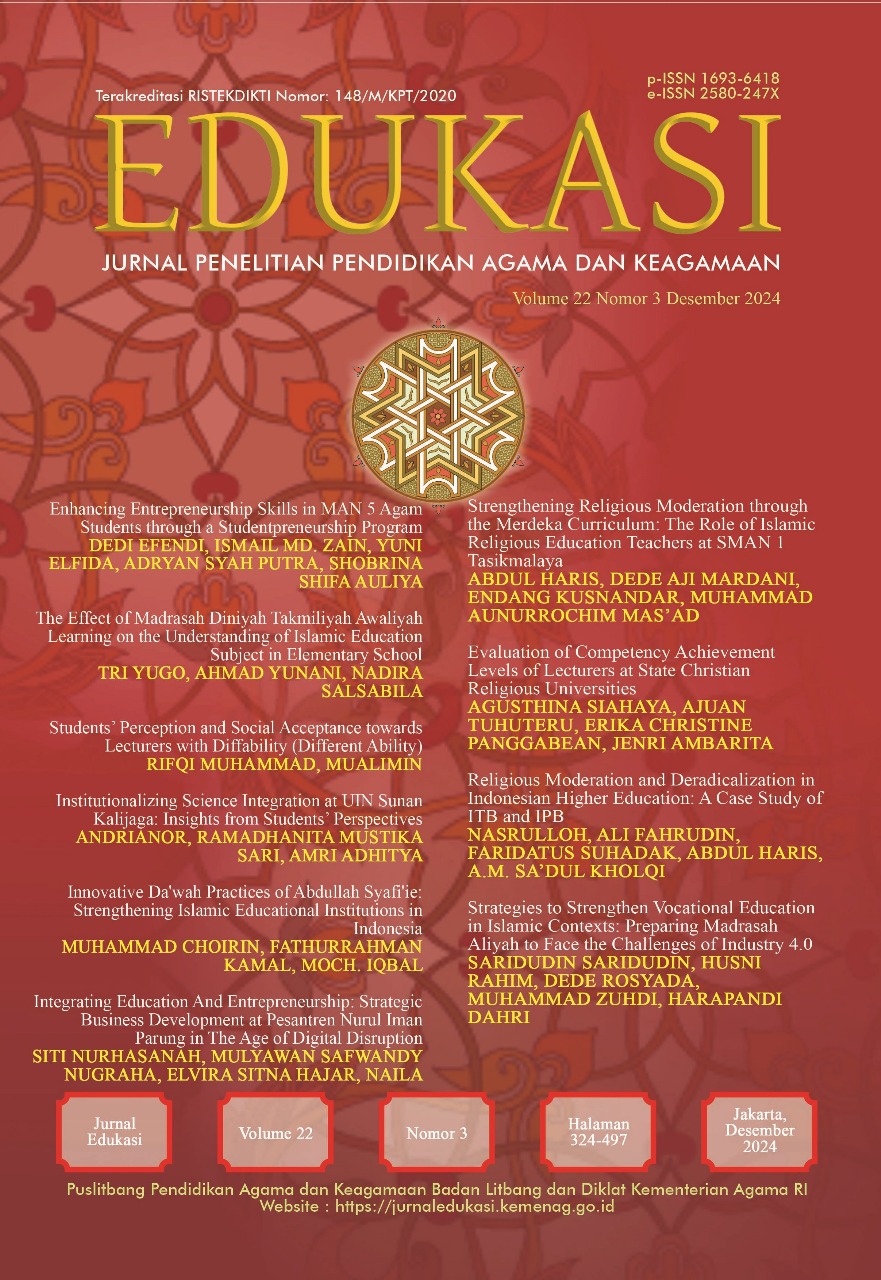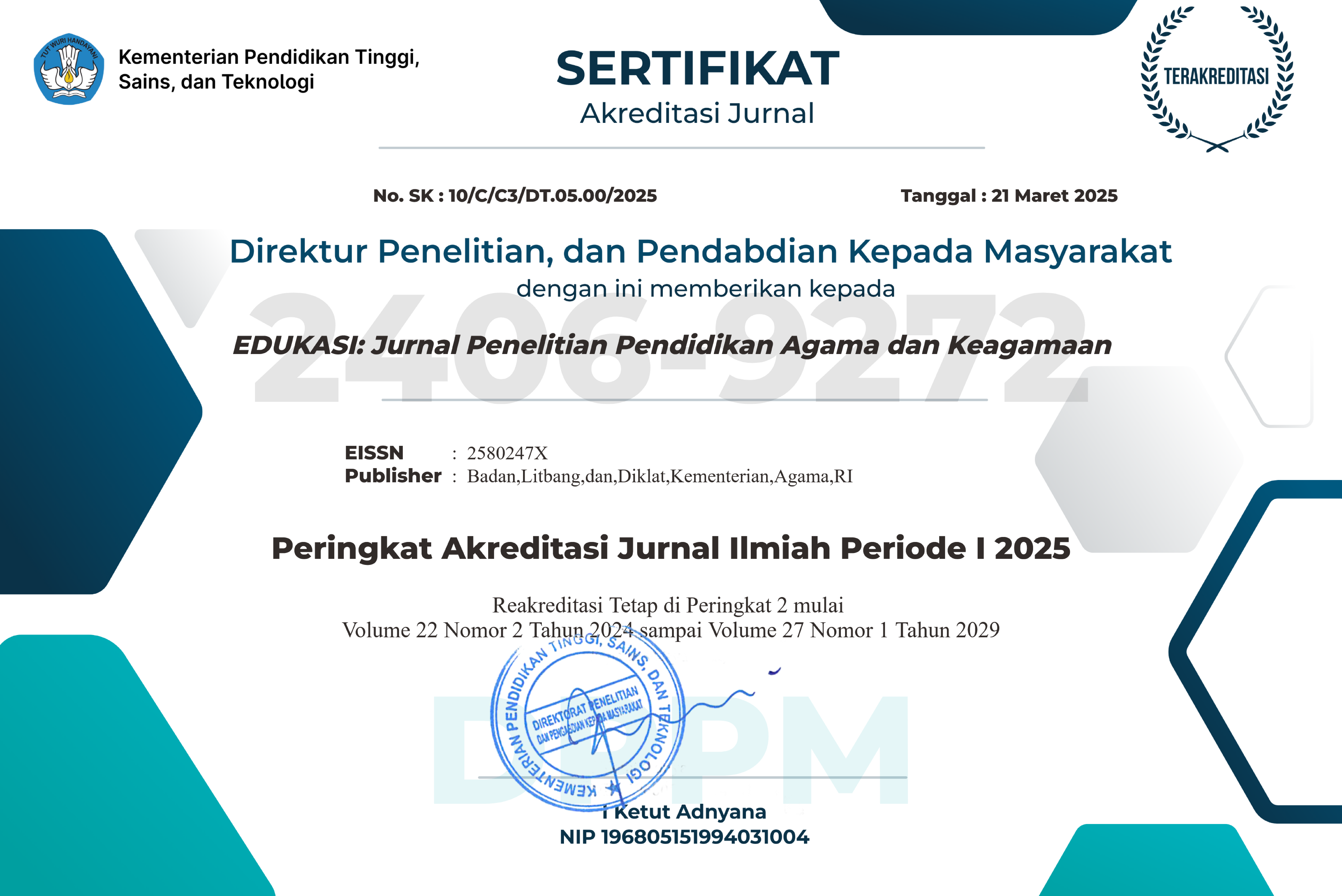Students’ Perception and Social Acceptance towards Lecturers with Diffability (Different Ability)
DOI:
https://doi.org/10.32729/edukasi.v22i3.1872Keywords:
Lecturer with Diffable, Perception, Social AcceptanceAbstract
Employing disabled lecturers on campus necessitates an inclusive culture which can be achieved through positive social perception and student acceptance. This study aims to (1) examine the relationship between student perception and social acceptance of disabled lecturers; (2) describe the differences in student perception and social acceptance based on gender. A quantitative survey approach was employed, with the study conducted at the IAIS Sambas campus, Indonesia. The respondents comprised 102 active students from the Faculty of Da'wah and Humanities. Data analysis included correlation analysis, t-tests, and ANOVA. The results of this study indicate: (1) a positive and very strong correlation (r = 0.626) between student perception and social acceptance of disabled lecturers, and 2) that female students have more favorable perceptions and higher social acceptance of disabled lecturers compared to male students. These results contribute empirically to the field of inclusive education in Indonesia, particularly within Islamic religious colleges.
Downloads
References
Adiputra, S., Mujiyati, M., & Hendrowati, T. Y. (2019). Perceptions of inclusion education by parents of elementary school-aged children in Lampung, Indonesia. International Journal of Instruction, 12(1), 199–212. https://doi.org/10.29333/iji.2019.12113a
Ainscow, M., Slee, R., & Best, M. (2019). Editorial: The Salamanca Statement: 25 years on. International Journal of Inclusive Education, 23(7–8), 671–676. https://doi.org/10.1080/13603116.2019.1622800
Alegre de la Rosa, O. M., & Villar Angulo, L. M. (2021). Teachers’ and hearing and speech specialists’ attitudes towards and knowledge of sustainable inclusive education for students using hearing devices. International Journal of Inclusive Education, 1–16. https://doi.org/10.1080/13603116.2021.1938711
Almutlaq, H. (2022). Knowledge of some evidence-based practices utilized for managing behavioral problems in students with disabilities and barriers to implementation: Educators’ perspectives. International Journal of Learning, Teaching and Educational Research, 21(8), 288–306. https://doi.org/10.26803/ijlter.21.8.17
Alqarni, T., Alsolmi, A. S., Algethami, R., Alsolmi, A., & Adhabi, E. (2019). College students’ knowledge and attitudes toward the Inclusion of Persons with Disabilities in the University. Education, 9(1), 9–18. https://doi.org/10.5923/j.edu.20190901.02
Amor, A. M., Hagiwara, M., Shogren, K. A., Thompson, J. R., Verdugo, M. Á., Burke, K. M., & Aguayo, V. (2019). International perspectives and trends in research on inclusive education: A systematic review. International Journal of Inclusive Education, 23(12), 1277–1295. https://doi.org/10.1080/13603116.2018.1445304
Bartholomeu, D., Montiel, J. M., Couto, G., Bueno, C. H., Garcia, F. H. S., & Pessotto, F. (2021). Social skills and social acceptance in different educational levels: A cross-sectional study. Psychology, 12(11), 1886–1899. https://doi.org/10.4236/psych.2021.1211114
Burmeister, A. (2014). Peer acceptance and the emotional well-being of disabled individuals. Student Journals and Publications at University of New Hampshire Scholars’ Repository, 6(1). https://scholars.unh.edu/perspectives/vol6/iss1/1/
Candrasa, L., & Cen, C. C. (2023). The effect of teacher teaching, learning methods and students perceptions on the student’s learning achievement in Medan City. JPPI (Jurnal Penelitian Pendidikan Indonesia), 9(1). https://doi.org/10.29210/020221737
De Vroey, A., Struyf, E., & Petry, K. (2016). Secondary schools included: A literature review. International Journal of Inclusive Education, 20(2), 109–135. https://doi.org/10.1080/13603116.2015.1075609
Ehlinger, E., & Ropers, R. (2020). “It’s all about learning as a community”: Facilitating the learning of students with disabilities in higher education classrooms. Journal of College Student Development, 61(3), 333–349. https://doi.org/10.1353/csd.2020.0031
Escámez, J. (2019). La perspectiva cognitiva para la comprensión de las intenciones y la predicción de las conductas del estudiantado como agente de sostenibilidad. In La Ciudadanía Europea Como Labor Permanente (pp. 211–232). Tirant lo Blanch. https://www.researchgate.net/publication/337185608_La_perspectiva_cognitiva_para_la_comprension_de_las_intenciones_y_la_prediccion_de_las_conductas_del_estudiantado_como_agente_de_sostenibilidad
Evanjeli, L. A. (2021). Students’ knowledge and attitudes towards inclusion in college. Jurnal Cakrawala Pendidikan, 40(1), 253–264. https://doi.org/10.21831/cp.v40i1.36150
Firat, T. (2020). An examination of the social acceptance levels of gifted students toward students with disabilities. Exceptionality Education International, 30(1), 75–96. https://doi.org/10.5206/eei.v30i1.10916
Garrote, A., Felder, F., Krähenmann, H., Schnepel, S., Sermier Dessemontet, R., & Moser Opitz, E. (2020). Social acceptance in inclusive classrooms: The role of teacher attitudes toward inclusion and classroom management. Frontiers in Education, 5. https://doi.org/10.3389/feduc.2020.582873
Garrote, A., Sermier Dessemontet, R., & Moser Opitz, E. (2017). Facilitating the social participation of pupils with special educational needs in mainstream schools: A review of school-based interventions. Educational Research Review, 20, 12–23. https://doi.org/10.1016/j.edurev.2016.11.001
Gökbulut, Ö. D., Gökbulut, B., & Yeniasır, M. (2017). Social acceptance of students with special needs from peer viewpoint. EURASIA Journal of Mathematics, Science and Technology Education, 13(11). https://doi.org/10.12973/ejmste/79592
Grenier, M. A., Horrell, A., & Genovese, B. (2014). Doing things my way: Teaching Physical Education with a disability. Adapted Physical Activity Quarterly, 31(4), 325–342. https://doi.org/10.1123/apaq.2013-0089
Hurlock, E. B. (2013). Perkembangan Anak Jilid 1 (Edisi Keenam). Jakarta: Erlangga.
Hutabarat, Z. S., & Phongsavath, P. (2023). Students’ perceptions about teaching profession: Emotional intelligence, critical thinking, and locus of control. Journal of Innovation in Educational and Cultural Research, 4(2), 191–199. https://doi.org/10.46843/jiecr.v4i1.452
Jung, Y. H., Kang, S. H., Park, E.-C., & Jang, S.-Y. (2022). Impact of the acceptance of disability on self-esteem among adults with disabilities: A Four-Year Follow-Up Study. International Journal of Environmental Research and Public Health, 19(7), 3874. https://doi.org/10.3390/ijerph19073874
Kaur, G., & Leong, T. P. (2018). Acceptance of Disability: A perspective from people with disability. Asian Journal of Behavioural Studies, 3(10), 1. https://doi.org/10.21834/ajbes.v3i10.75
Kaur, G., Leong, T. P., Yusof, J. M., & Singh, D. (2015). Perception of people with disability in creating sustainable public policy. Procedia - Social and Behavioral Sciences, 168, 145–155. https://doi.org/10.1016/j.sbspro.2014.10.220
Kemdikbud. (2022). Data Dosen. Kemdikbud.Go.Id. https://pddikti.kemdikbud.go.id/data_dosen/
Kwiatkowska-Ciotucha, D., Załuska, U., & Grzes´kowiak, A. (2020). Osoby z Niepełnosprawnos´cia˛ na Otwartym Rynku Pracy. Bariery Skutecznej Inkluzji w Miejscu Pracy. Publishing House of Wrocław University of Economics.
Lindner, K.-T., Schwab, S., Emara, M., & Avramidis, E. (2023). Do teachers favor the inclusion of all students? A systematic review of primary schoolteachers’ attitudes towards inclusive education. European Journal of Special Needs Education, 38(6), 766–787. https://doi.org/10.1080/08856257.2023.2172894
Marmoah, S., & Poerwanti, J. I. S. (2022). Lecturers and students’ perceptions about online learning problems during the COVID-19 pandemic. Journal of Education and Learning (EduLearn), 16(4), 524–530. https://doi.org/10.11591/edulearn.v16i4.20350
Muntaner Guasp, J. J., Rosselló Ramón, M. R., & De la Iglesia Mayol, B. (2016). Buenas prácticas en educación inclusiva. Educatio Siglo XXI, 34(1 Marzo), 31. https://doi.org/10.6018/j/252521
Neca, P., Borges, M. L., & Pinto, P. C. (2022). Teachers with disabilities: A literature review. International Journal of Inclusive Education, 26(12), 1192–1210. https://doi.org/10.1080/13603116.2020.1776779
Nilholm, C., & Göransson, K. (2017). What is meant by inclusion? An analysis of European and North American journal articles with high impact. European Journal of Special Needs Education, 32(3), 437–451. https://doi.org/10.1080/08856257.2017.1295638
Özlü, B., & Serin, N. B. (2021). Social acceptance levels of normal developed students towards disable students. International Journal of Evaluation and Research in Education (IJERE), 10(4), 1159. https://doi.org/10.11591/ijere.v10i4.21882
Papadakaki, M., Maraki, A., Bitsakos, N., & Chliaoutakis, J. (2022). Perceived knowledge and attitudes of faculty members towards inclusive education for students with disabilities: Evidence from a Greek university. International Journal of Environmental Research and Public Health, 19(4). https://doi.org/10.3390/ijerph19042151
Pranowo, D. D., Dwijonagoro, S., Lumban Tobing, R., & Purinthrapibal, S. (2023). Student perceptions on high school teachers’ competence in online teaching. Jurnal Cakrawala Pendidikan, 42(3). https://doi.org/10.21831/cp.v42i3.59237
Law of the Republic of Indonesia No. 8 on Persons with Disabilities, (2016). https://peraturan.bpk.go.id/Home/Details/37251/uu-no-8-tahun-2016
Rahmawati, E., Jayanti, I. D., & Khomisah, A. (2022). Pengaruh metode I’rab al-qur’an terhadap kemampuan menghafal Al-qur’an santri Pondok Pesantren Nurul Furqon Rembang. EDUKASI: Jurnal Penelitian Pendidikan Agama Dan Keagamaan, 20(1), 1–14. https://doi.org/10.32729/edukasi.v20i1.1065
Roca-Hurtuna, M., & Sanz-Ponce, R. (2023). The perception of university students towards people with disabilities and their labor insertion. Education Sciences, 13(1), 79. https://doi.org/10.3390/educsci13010079
Saadun, S. J., Abdullah, M. Z., Mohamed Besir, M. S., Jamal, A., Mat Hasan, N. Z., Nordin, N. A., & Imran Nanang, J. Q. (2023). Perceptions of disability among university students. Information Management and Business Review, 15(3(SI)), 205–211. https://doi.org/10.22610/imbr.v15i3(SI).3473
Sari, D. N., Asri, R. C., & Fadila, Z. (2023). Perception of distance learning among undergraduate medical students during COVID-19 pandemic. Journal of Education and Learning (EduLearn), 17(3), 335–341. https://doi.org/10.11591/edulearn.v17i3.20731
Schwab, S. (2018). Susanne Schwab Attitudes Towards Inclusive Schooling. Waxmann Verlag. https://www.researchgate.net/publication/326894155_Susanne_Schwab_Attitudes_Towards_Inclusive_Schooling
Shahrill, M., Nurhasanah, F., Ibrahim, S. A., Prahmana, R. C. I., Asamoah, D., Mohammad, H., & Gan, A. L. (2023). Exploring students’ perceptions of private Mathematics tutoring in three countries. Infinity Journal, 12(2), 339–358. https://doi.org/10.22460/infinity.v12i2.p339-358
Sintawati, M., Sukma, H. H., Mardati, A., Feruzi, S. M., & Satrianawati, S. (2024). Pre-service teachers’ pedagogical knowledge and attitudes towards slow learner students. Journal of Education and Learning (EduLearn), 18(4), 1117–1124. https://doi.org/10.11591/edulearn.v18i4.21626
Syafnan, S., Ritonga, M., & Lubis, F. S. (2022). Student perception of the online lecture system during the COVID-19 period. Journal of Innovation in Educational and Cultural Research, 3(2), 80–85. https://doi.org/10.46843/jiecr.v3i2.67
Tarantino, G., Makopoulou, K., & Neville, R. D. (2022). Inclusion of children with special educational needs and disabilities in physical education: A systematic review and meta-analysis of teachers’ attitudes. Educational Research Review, 36, 100456. https://doi.org/10.1016/j.edurev.2022.100456
Van Mieghem, A., Verschueren, K., Petry, K., & Struyf, E. (2020). An analysis of research on inclusive education: A systematic search and meta review. International Journal of Inclusive Education, 24(6), 675–689. https://doi.org/10.1080/13603116.2018.1482012
Visse, M. (2016). Students Perceptions of Individuals with Intellectual and Developmental Disabilities and the Impact of Inclusion [Eastern Kentucky University]. https://encompass.eku.edu/cgi/viewcontent.cgi?article=1322&context=honors_theses
Walker, V. L., DeSpain, S. N., Thompson, J. R., & Hughes, C. (2014). Assessment and Planning in K-12 Schools: A Social-Ecological Approach. Inclusion, 2(2), 125–139. https://doi.org/10.1352/2326-6988-2.2.125
Ware, H., Singal, N., & Groce, N. (2022). The work lives of disabled teachers: Revisiting inclusive education in English schools. Disability & Society, 37(9), 1417–1438. https://doi.org/10.1080/09687599.2020.1867074
Yusup, M. Y. (2022). Pondok Pesantren dan Penerimaan Penyandang Disabilitas sebagai Upaya Menciptakan Keadilan bagi Kelompok Rentan. AT-THARIQ: Jurnal Studi Islam Dan Budaya, 2(1), 1–10. https://ejournal.stais.ac.id/index.php/trq/article/view/142/78
Downloads
Published
Issue
Section
License
Copyright (c) 2024 Rifqi Muhammad, Mualimin Mualimin

This work is licensed under a Creative Commons Attribution-ShareAlike 4.0 International License.









